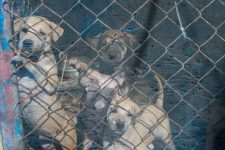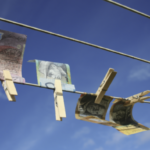Victoria Bans Pet Shops from Selling Puppies

In what many are calling a bold and compassionate move, the Victorian government has passed legislation to ban puppy farming in the state.
Animal welfare groups see the new legislation as a significant step forward, one which seeks to prevent the horrific conditions many breeding dogs are kept in. They point out that some dogs spend virtually their entire lives in cramped wire cages, giving birth to litter after litter, with barely enough food and water to survive.
Many are never exercised or socialised, and some are even left lying in their own faeces and urine.
An end to the cruelty
Such inhumane practices are commonplace across Australia. It’s the ‘puppies-for-profit’ mentality, the dark side of the dog breeding industry, kept hidden behind the façade of cute animals sitting in pet shop windows.
The RSPCA receives thousands of complaints about puppy farms and kitten factories every year, but with limited resources, the organisation is unable to investigate them all but a few.
One of the problems is that the industry remains largely unregulated across all states and territories, leaving opportunistic breeders free to treat their ‘property’ as they wish.
Pet shops can no longer sell puppies
But Victoria’s new legislation will change all that in the southern state, introducing regulations that make it illegal for any breeder to have more than 50 female dogs at any one time.
Breeders will need to seek ministerial approval to have more than 10 female dogs, and will be subject to stricter regulations. It’s the first time Australia has placed restrictions on the number of dogs a breeder can have.
The reforms also make it illegal for pet shops to sell pups. Puppies can now only be purchased from registered breeders, or from dog adoption or rescue homes such as the RSPCA.
Anyone selling a puppy must also provide a registered source number to show where the animal was bred. This means that a pup can be traced back to its birthplace, making it easier to keep a check on breeding conditions.
The legislation will come into force in 2020.
More adoptions encouraged
While pet shops will be banned from selling pups, they will be encouraged to become adoption centres for the thousands of dogs that need re-homing each year.
The RSPCA’s 2015-2016 report suggests that shelters around the country received more than 45,000 dogs and more than 55,000 cats during that 12 months. However, these numbers are only part of the picture – there are dozens of other shelters and re-homing programmes, such as those for specific breeds like greyhounds which are not counted in the figures.
And many pets are given away ‘free’ on websites like Gumtree and Facebook. These vulnerable animals often find themselves in homes that are far from loving – and can even be subjected to unthinkable cruelty.
What about New South Wales?
In our state, there is currently no specific law banning puppy farms, apart from having permission from the local council.
With no registration required, and no formal audits and inspections, such operations are difficult industry to monitor and regulate.
That said, breeders who treat their animals cruelly may be liable to prosecution under the Prevention of Cruelty to Animals Act 1979.








